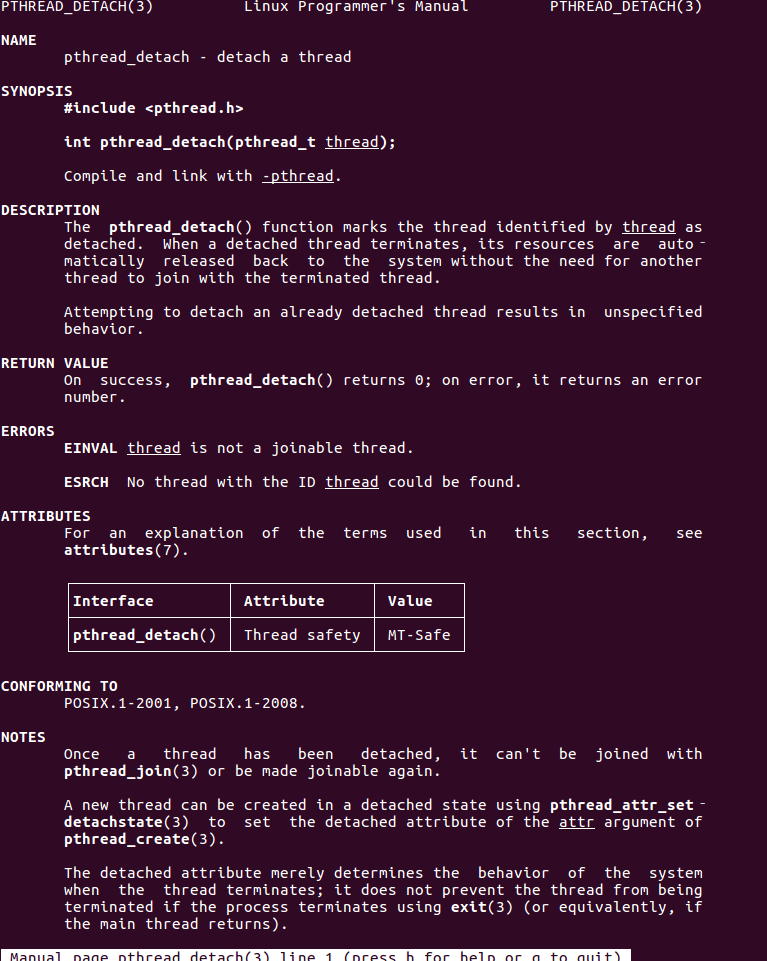1. Thread Control Chart
Main Thread<->|Work Queue|<->Work 1<->Work 2<->Work 3
Thread 1<-> | Work Queue |<->Work 1<->Work 2<->Work 3
Thread 2<->|Work Queue|<->Work 1<->Work 2<->Work 3
Thread 3<->|Work Queue|<->Work 1<->Work 2<->Work 3
Second, the thread's identifier
Similar to process identifiers, each thread has a unique thread identifier (thread ID) in the process, which is represented by the data type pthread_t, which is essentially an unsigned long integer in Linux. LInux provides two functions for identifying threads with the following standard call format:
#include <pthread.h>
pthread_t pthread_self(void);The pthread_self function is used to get the thread identifier of the thread itself, and its return value is the thread identifier of the thread itself. The pthread_equal function is used to compare two thread identifiers, and its standard call format is described below:
#include <pthread.h>
int pthread_equal(pthread_tid, pthread_t tid2);3. Thread Control Related Functions
To compile a multithreaded program using gcc, you must link to the pthread library and compile it under the terminal using the following gcc-lpthread
1,pthread_create function
Document description
NAME
pthread_create - create a new thread
SYNOPSIS
#include <pthread.h>
int pthread_create(pthread_t *thread, const pthread_attr_t *attr,
void *(*start_routine) (void *), void *arg);
Compile and link with -pthread.
DESCRIPTION
The pthread_create() function starts a new thread in the calling
process. The new thread starts execution by invoking start_routine();
arg is passed as the sole argument of start_routine().
The new thread terminates in one of the following ways:
* It calls pthread_exit(3), specifying an exit status value that is
available to another thread in the same process that calls
pthread_join(3).
An example
#include <stdio.h>
#include <stdlib.h>
#include <string.h>
#include <pthread.h>
#include <unistd.h>
pthread_t ntid; //Thread id
//Functions to print identifiers
void printds(const char *s)
{
pid_t pid; //Process Identifier
pthread_t tid; //Thread Identifier
pid = getpid(); // Get process identifier id
//Gets the id of the thread identifier
tid = pthread_self();
printf("%s pid, %u tid %u (0x%x)\n", s, (unsigned int)pid, (unsigned int)tid, (unsigned int)tid); //Print process and thread id
}
//Functions that start running in a thread
void *thr_fn(void *arg)
{
printds("new thread:");
return ((void*)0);
}
int main(void)
{
int err;
err = pthread_create(&ntid, NULL, thr_fn, NULL); //Create a thread
// Print financial label if error occurs
if (err != 0)
{
printf("can't create thread %s\n", strerror(err));
}
//Print main thread number
printds("main thread:");
sleep(1);
exit(0);
return 0;
}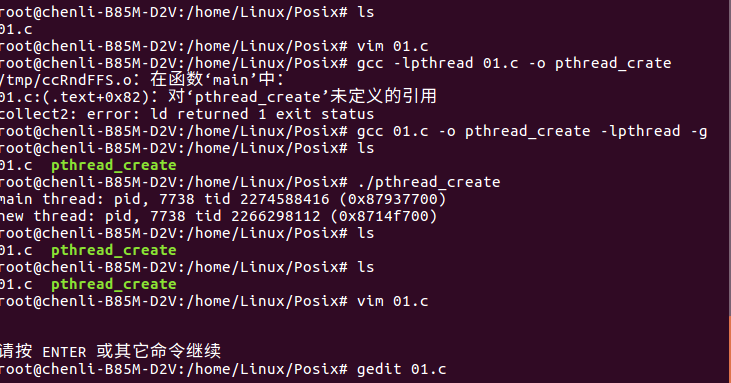
You can see that the process with the identifier 7738 created two threads with the identifiers 2274588416 and 22266298112, respectively.
2,pthread_exit function
A process can call the exit series function to exit the current process, or a thread can exit in three ways, and stop the thread's control flow without terminating the entire process.
1, the thread is only returned from the startup column type, the return value is the thread's exit code.
2. Threads can be terminated by other processes in the same process.
3, the thread calls the pthread_exit function to exit
The Linux kernel provides pthread_exit functions to actively exit threads, which are prototyped in the LInux library:
NAME
pthread_exit - terminate calling thread
SYNOPSIS
#include <pthread.h>
void pthread_exit(void *retval);
Compile and link with -pthread.
DESCRIPTION
The pthread_exit() function terminates the calling thread and returns a
value via retval that (if the thread is joinable) is available to
another thread in the same process that calls pthread_join(3).
Any clean-up handlers established by pthread_cleanup_push(3) that have
not yet been popped, are popped (in the reverse of the order in which
they were pushed) and executed. If the thread has any thread-specific
data, then, after the clean-up handlers have been executed, the corre‐
sponding destructor functions are called, in an unspecified order.
3. The pthread_join function My understanding is to execute the pthread_create function without the pthread_join function
If a thread can be blocked by other threads after it has finished executing, and then wait for the specified thread to call pthread_exit to return from the boot or cancel, the LInux kernel can call the pthread_join function to complete the blocking of the thread. Its prototype in the LInux function library is:
NAME
pthread_join - join with a terminated thread
SYNOPSIS
#include <pthread.h>
int pthread_join(pthread_t thread, void **retval);
Compile and link with -pthread.
DESCRIPTION
The pthread_join() function waits for the thread specified by thread to
terminate. If that thread has already terminated, then pthread_join()
returns immediately. The thread specified by thread must be joinable.
If retval is not NULL, then pthread_join() copies the exit status of
the target thread (i.e., the value that the target thread supplied to
pthread_exit(3)) into the location pointed to by *retval. If the tar‐
get thread was canceled, then PTHREAD_CANCELED is placed in *retval.
If multiple threads simultaneously try to join with the same thread,
Return: If the call is successful, the function returns 0 and vice versa, a non-zero value
Example:
#include <stdio.h>
#include <string.h>
#include <stdlib.h>
#include <unistd.h>
#include <pthread.h>
void print_msg(char *ptr);
int main(void)
{
pthread_t thread1, thread2;
int i, j;
void *retval;
char *msg1 = "This is the frist thread\n";
char *msg2 = "This is the second thread\n";
pthread_create(&thread1, NULL, (void *)(&print_msg),(void *)msg1);
pthread_create(&thread2, NULL, (void *)(&print_msg), (void *)msg2); //Create two threads
pthread_join(thread1, &retval);
pthread_join(thread2, &retval);
return 0;
}
//Print Information Function, from which the thread executes
void print_msg(char *ptr)
{
int i;
for( i = 0; i < 10; i++)
{
//Continuous output of 10 strings
printf("%s\n", ptr);
}
}
Running Effect Diagram 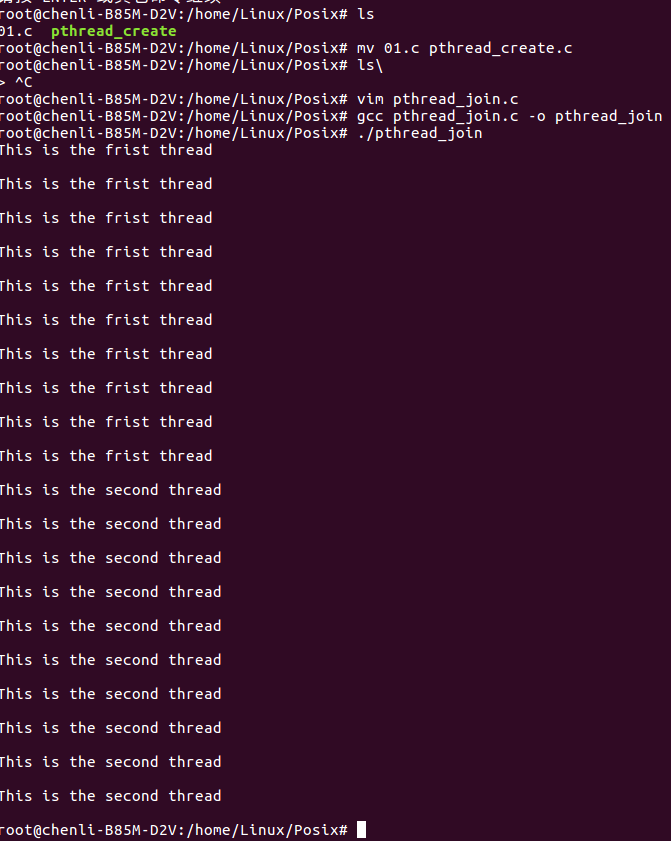
4,pthread_cancel function
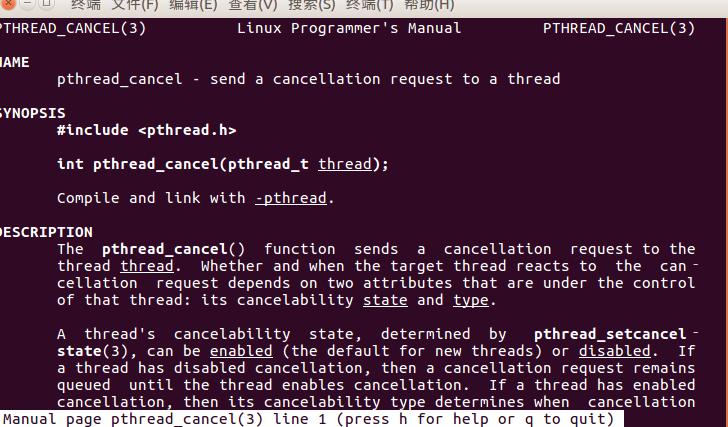
Return: If the operation returns 0 successfully, the failure returns the corresponding error code
5,pthread_cleanup_push and pthread_cleanup_pop functions
When the pthread_cancel function is called to cancel a thread, the corresponding function needs to be called to clean up the environment after the process exits. 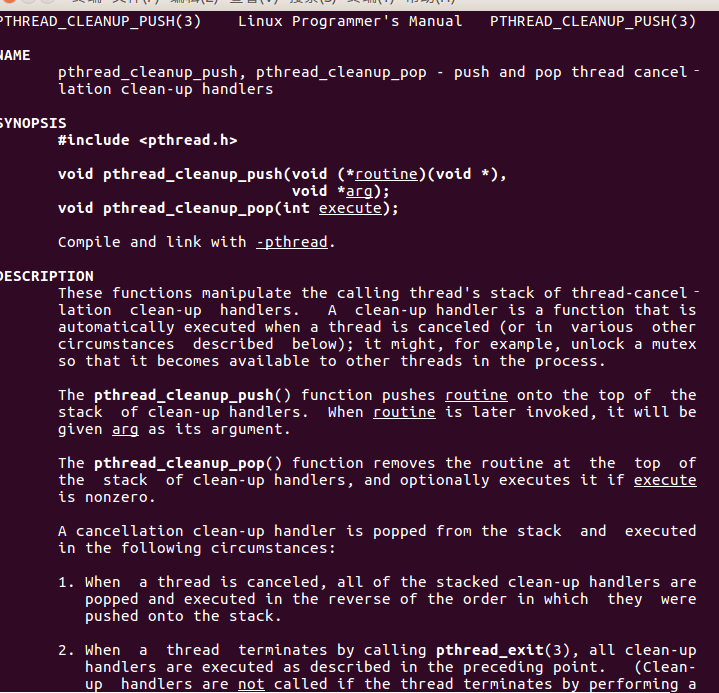
1, when calling the pthread_exit function
2, in response to a cancellation request
3, when pthread_cleanup_pop is called with a non-execute parameter
6,pthread_detach function
